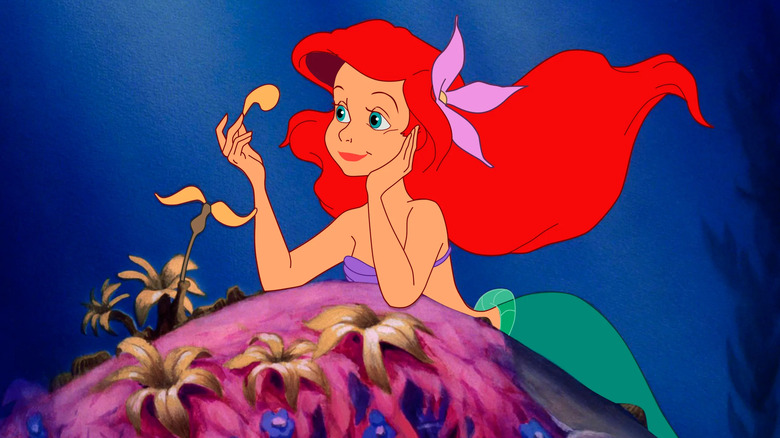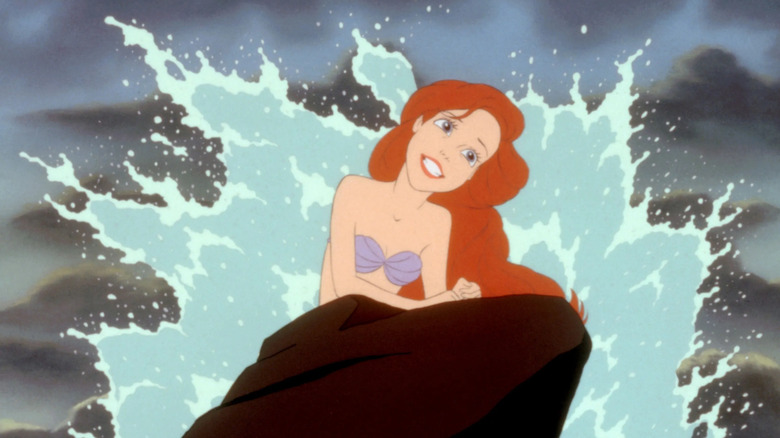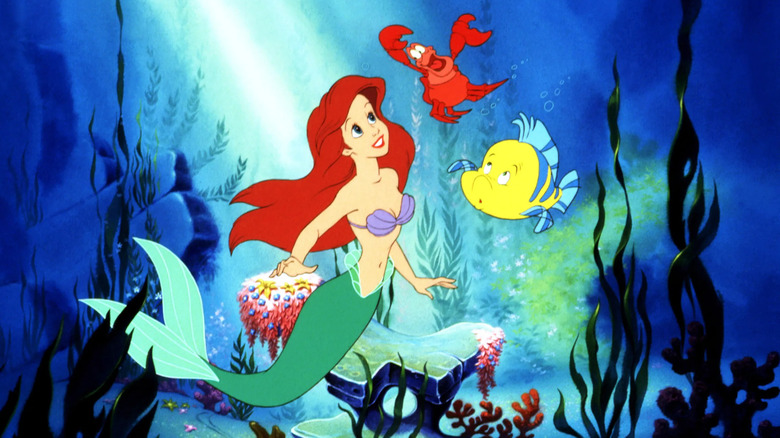Why The Little Mermaid Was A Vital Turning Point For Disney
"The Little Mermaid" is one of Disney's most enchanting animated films, complete with vivid colors, emotional musical sequences, and beguiling characters. At the heart of the film is the little mermaid herself: Ariel, a strong-willed, curious princess with a passion for adventure. You know the story: She dreams of being part of the human world, especially after she rescues the handsome Prince Eric from a shipwreck. Ariel makes a deal with the scheming sea witch Ursula to become human, with the caveat that she will not have a voice and must convince Eric to fall in love with her in three days.
According to the DVD commentary, Walt Disney himself was originally going to make "The Little Mermaid" during the late 1930s in a film that would cover multiple Hans Christian Andersen stories, but the studio opted for "Snow White and the Seven Dwarfs" instead, perhaps finding it difficult to adapt a fairy tale that ends with the suicide of its main character. It was not until 1985 that filmmaker Ron Clements became interested in an adaptation of "The Little Mermaid" when he came across the story in a bookstore.
Together, co-directors and writers Ron Clements and John Musker made drastic changes to the narrative so that it would be more uplifting and fit within the happily-ever-after Disney paradigm. In a bonus feature called "Treasures Untold: The Making of Disney's 'The Little Mermaid'" on the movie's Platinum Edition home release, we learned studio chief Jeffrey Katzenberg was wary of its similarities to the live-action, mermaid-out-of-water romantic comedy "Splash," and Ariel was given her trademark red hair to set her apart from the blonde Daryl Hannah.
Thankfully Katzenberg approved the project, because its November 13, 1989 release was met with critical acclaim and commercial prosperity, earning over $230 million worldwide. Not only did "The Little Mermaid" become one of the most iconic and revered Disney films ever made, it changed the landscape of Disney animation in several significant ways.
It brought back the fairy tale musical
"The Little Mermaid" was Disney's first animated fairy tale since "Sleeping Beauty" in 1959. From the '60s through the '80s, Disney continued to make animated films, but they were not focused on princesses or fairy tales. Most were adaptations of classic stories, such as "The Jungle Book" or "Robin Hood," and the majority of them centered on male protagonists. In the 1970s, Disney abandoned the romantic, "feminine" stories of true love's kiss for dark tales like "The Black Cauldron" to match the edgier blockbusters that general audiences were flocking to, such as "Jaws" and "Star Wars." This gloomy time period after Walt Disney's death was known as the Dark Age of Disney.
The popularity of "Who Framed Roger Rabbit," a zany comedy and groundbreaking mix of live-action and animation, paved the way for some more lighthearted fare. "Oliver & Company," a spin on "Oliver Twist" with cats and dogs, featured songs from famous musicians such as Billy Joel and Huey Lewis. Disney used the film to test the inclusion of musical numbers after so many years without or the limited use of them. "The Little Mermaid" would include Broadway-style songs, written by "Little Shop of Horrors" lyricist Howard Ashman and composer Alan Menken, to structure the narrative.
All of the songs in "The Little Mermaid" have emotional gravitas and propel the story forward; they articulate the characters' motivations and inner feelings. From the Calypso-style romp "Under the Sea," the dreamy ballad "Kiss the Girl," and the sassy "Poor Unfortunate Souls," all of the songs in "The Little Mermaid" have become popular culture mainstays. "Part of the Your World" is the key "I Want" song, a musical theatre staple in which the protagonist sings about why they are unsatisfied with their current circumstances and what they yearn to change. The heartfelt ballad perfectly encapsulates Ariel's desire to be human. It's unfathomable to imagine "The Little Mermaid" without it — but it was almost cut by Katzenberg when children became rowdy during the scene at a test screening (via Insider).
"Treasures Untold: The Making of Disney's 'The Little Mermaid" reveals that Katzenberg warned Clements and Musker that "The Little Mermaid" would make less money at the box office because it was a "girl's film." But the joke was on him, because "The Little Mermaid" was a smashing success, ushering in a new wave of fairy tale and princess films that became the most renowned in Disney's canon. Audiences were captivated by Ariel, a determined heroine whose passion for the human world came before romantic love, a fierce young woman who was never going to give up on her dreams.
It began the Disney Renaissance
"The Little Mermaid" kickstarted the Disney Renaissance, a phenomenal string of films released during the next decade that became instant classics. "Here at last, once again, is the kind of liberating, original, joyful Disney animation that we all remember from 'Snow White,' 'Pinocchio' and the other first-generation classics," Roger Ebert marveled in his review. "The Little Mermaid" marked a triumphant return to the "music-driven, ornately drawn fairy tales of the studio's heyday," while having its own unique charm, Consequence observes. The films that followed, such as "Beauty and the Beast," "Aladdin," "The Lion King," "Hercules," and "Mulan," are based on a mix of fairy tales and legends, add to the roster of beloved Disney princesses, and have memorable, exciting songs.
The resurgence of the original Disney formula was an overwhelming achievement both critically and financially, setting into motion a prioritization of animated films that had not been seen since the 1950s. It was not until the emergence of Disney and Pixar's partnership, resulting in films such as "Toy Story" and "Monster's Inc.," that the Disney Renaissance ended. A live-action version of "The Little Mermaid" is currently slated for release in 2023. Will it breathe some new life into the photo-real remakes of Disney's animated classics? Could a different kind of renaissance be upon us? We'll have to wait and see.


